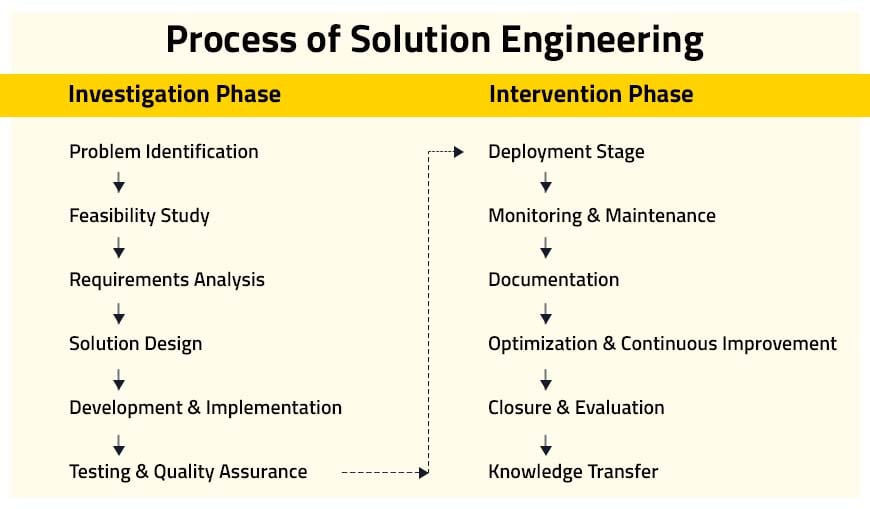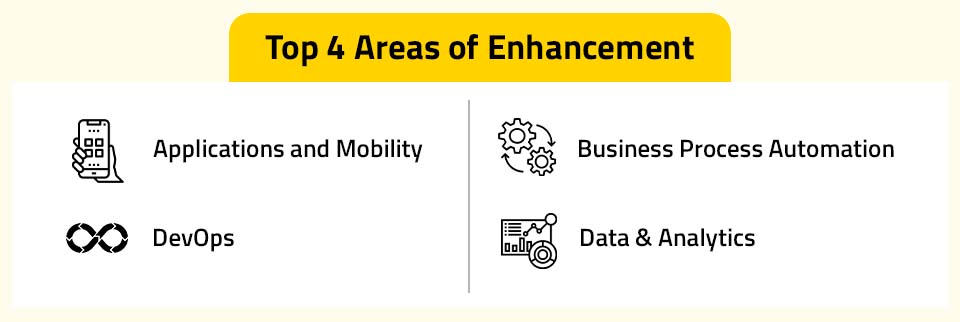Software Engineering | 25 Oct 2023 | 11 min
Solving IT Puzzles: A Guide to Solution Engineering

Ask yourself – What are the most important things for an organization in this ever-evolving IT space?
Well, the answer is threefold:
To do so, companies want to grapple with cutting-edge software-driven solutions that blend software and product engineering, data integration, and streamlined processes.
These solutions are essential for achieving optimal results and innovation is the key. Here, solution engineering plays a hero’s role, acting as the bridge connecting all these elements. With it, you can make the extraordinary possible in IT.
In this blog, I will help you understand the depths of:
Here’s the exciting part – you will be introduced to our expertise to enhance your organization’s software engineering experience as you keep reading.
Let’s start off by knowing the concept of solution engineering.
Imagine you have a puzzle, and it’s missing a few crucial pieces.
Solution engineering is like being the puzzle master – it’s all about systematically and skillfully finding the missing parts and putting them together.
In the world of business and technology, this approach is used to design and deliver solutions for complex problems.
Whether it’s creating new software, optimizing IT systems, or integrating different parts of a project, solution engineering applies structured engineering principles to achieve efficient results. It’s not just limited to software development but is versatile and can be applied to various fields.
Now that you have a brief understanding of solution engineering, let’s delve deeper into its significance. This will help you grasp how valuable it can be for the growth of your product team.
Solution engineering offers several benefits in the context of solving complex problems and developing effective solutions in various fields.
Here are the top 10 key advantages solution engineering possesses:
Quick note: Talking about the advantages, I remembered the way we helped a customer digitize the material movement handling workflow through our automated solution engineering approach. This significantly reduced their material waste by automating – material movement processes and workflows.
Yes, that’s the inherent power it holds.
Well, understanding a concept and applying it are two distinct tasks, much like attempting to assemble a product after only reading the instructions once.
In the context of solution engineering, I will serve as your guide, shedding light on the precise steps needed to excel in this ever-changing market.
Solution engineering is a systematic process involving several key steps, designed to tackle specific problems or challenges. Here’s a concise breakdown of these steps:

To make the afore-mentioned process successful, these are the important things required:
In addition to these, the process involves the participation of numerous individuals in roles such as –
| Business Analysts | Solution Architects | System Architects | Software Developers |
| Hardware Engineers | Quality Assurance Testers | Project Managers | Technical Writers |
| UI/UX Designers | Database Administrators | Network Engineers | Security Experts |
| DevOps Engineers | Data Scientists/Analysts | Stakeholders | End-Users |
This could be the perfect chance to bring in talented individuals who can enhance specific aspects of your product team.

Fetch more details HERE.
Let’s explore these areas in the next section.

Solution engineering empowers you to concentrate on four key areas, ensuring tailored and user-friendly solutions.
Let’s delve into each segment and discover how they benefit from solution engineering, ultimately driving organizational success:
In a nutshell, we have understood that:
So, as the demand for software and technology solutions continues to rise, the future of solution engineering appears promising, with both – business growth and opportunities for skilled solution engineers to advance their careers.
Talking about the same context, we, Nitor Infotech, cater to all four areas mentioned and provide professional software engineering experience.
Reach out to us for such cutting-edge IT services and developments.

we'll keep you in the loop with everything that's trending in the tech world.
